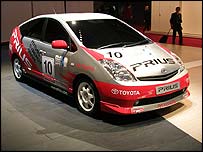By Jorn Madslien
BBC News Online business reporter at the Paris Motor Show
The Toyota Prius petrol and electric hybrid car which has become such a hit in recent months with the green-thinking Hollywood set is about to be given a run for its money.
The latest challenger is built in-house, though, by Toyota Motor's luxury car subsidiary Lexus.
On show at the Paris Motor Show, the Lexus RX400h Sports Utility Vehicle (SUV) offers right thinking Californians the chance to be green, or at least relatively so, while at the same time driving a powerful car.
Utility Vehicle (SUV) offers right thinking Californians the chance to be green, or at least relatively so, while at the same time driving a powerful car.
 Utility Vehicle (SUV) offers right thinking Californians the chance to be green, or at least relatively so, while at the same time driving a powerful car.
Utility Vehicle (SUV) offers right thinking Californians the chance to be green, or at least relatively so, while at the same time driving a powerful car.(Right Picture: An attractive mix, powerful yet kind to the environment)
The Lexus Sports Utility Vehicle has a 3.3 litre V6 petrol engine that delivers 286 bhp, as well as two electric motors - one in front, one in the back.
Toyota and Lexus vice president James Rosenstein insists the Lexus will travel 100 kilometres on 8 litres of petrol.
That might be good for a car this size, but it is hardly a green alternative to small cars.
Selling point
Nevertheless, the RX400h is expected to boost the Lexus brand, both in the US where it is already popular and in Europe where years of hard nosed marketing efforts have failed to boost market share.
"Hybrid will make a difference for Lexus," Mr Rosenstein insists. In the USA, the non-hybrid equivalent of the RX400h is called RX300. It is the most popular Lexus going.
equivalent of the RX400h is called RX300. It is the most popular Lexus going.
 equivalent of the RX400h is called RX300. It is the most popular Lexus going.
equivalent of the RX400h is called RX300. It is the most popular Lexus going.And yet, US dealers predict that the new hybrid will make up half its SUV sales in America as soon as it becomes available for customers.
(Right Picture: Toyota executives show off the latest model with a new, cleaner diesel engine)
In Europe, Mr Rosenberg hopes the hybrid SUV will help make up for recent years' disappointing performance.
Lexus has been weak in Europe because the design has not been adapted to European tastes and because we have not had diesel," he said.
New designs with "a bit more emotion", along with hybrid and diesel engines - both due to hit the market next year, could well appeal to Europeans lumbered with much more expensive petrol than the Americans, Mr Rosenberg suggested.
"The hybrid Lexus is also an answer to those who complain that SUVs are gas guzzlers," he said.
Competition
Other car makers are increasingly getting ready to follow Toyota Motor's suit and launch competing hybrid vehicles of their own.
Ahead of the pack is Honda which has been developing hybrid technologies of their own, alongside Toyota's. Peugeot is also in on the act with its stop-and-go technology.
alongside Toyota's. Peugeot is also in on the act with its stop-and-go technology.
 alongside Toyota's. Peugeot is also in on the act with its stop-and-go technology.
alongside Toyota's. Peugeot is also in on the act with its stop-and-go technology.(Picture Right: Toyota's Prius hybrid vehicle was just the beginning)
"We've licensed the technology to Ford (which has used it to launch its Escape SUV), we have licensed our technology to Nissan, and there has been contact with other manufacturers" Mr Rosenstein said.
"This is just the beginning," Mr Rosenstein said, promising several new hybrid models from both Toyota and Lexus in the near future.
